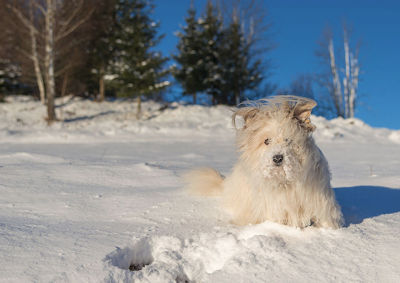 Not only can winter be a time of illness and injury if people fail to take appropriate health and safety precautions, but harsh winter weather conditions can be tough on pets as well. DeKalb County Animal Control Wardens offer valuable tips to keep your pet safe and healthy this winter.
Not only can winter be a time of illness and injury if people fail to take appropriate health and safety precautions, but harsh winter weather conditions can be tough on pets as well. DeKalb County Animal Control Wardens offer valuable tips to keep your pet safe and healthy this winter.
Remember, if it’s too cold for you, it’s probably too cold for your pet. Do not leave pets outdoors or in vehicles for extensive periods of time when it becomes uncomfortably cold.
Be aware of signs of hypothermia and frostbite in your pets. Signs of hypothermia include: violent shivering, listlessness, lethargy, muscle stiffness, lack of appetite. In pets, frostbite generally affects the tail, ear tips and pads of the feet as they are the most exposed and least protected by fur. Their skin will turn bright red followed by a pale coloration, eventually turning black as the tissue dies. If you suspect your pet is experiencing either, contact your vet immediately.
No matter what the temperature, wind chill can threaten a pet’s life. If your dog is an outdoor dog, it should be protected by a dry, draft-free doghouse that is large enough to allow the dog to sit and lie down comfortably, but small enough to hold in its body heat. The floor should be raised a few inches off the ground and covered with cedar shavings or straw. The house should face away from the wind, and the doorway should be covered with waterproof covering or heavy plastic.
Pets that spend a lot of time outside during the winter need more food because keeping warm depletes energy. Make sure to routinely check your pet’s water dish to make sure water is fresh and unfrozen. Use plastic food and water bowls because when the temperature is low, the pet’s tongue can stick and freeze to the metal.
Salt and other chemicals used to melt snow and ice can irritate the pads of your pet’s feet. Wipe the feet with a damp towel before your pet licks them and irritates its mouth. Trim excess fur from your pet’s pads so that ice and snow do not accumulate between its toes which can cause discomfort.
Antifreeze is a deadly poison with a sweet taste, which may attract animals. Wipe up spills and store antifreeze out of reach. If possible, use antifreeze coolant made with propylene glycol. If this is swallowed in small amounts, it will not hurt pets.
Do not allow your dog to run freely on open ice. It can be difficult to judge the safety of the ice, and your dog could be at risk of falling through.
During the winter, it is best to keep your pets inside with the family. The happiest dogs are those that are taken out frequently for walks and exercise, but are kept inside the rest of the time.
For more information on pet safety, please call DeKalb County Health Department’s Animal Control at: (815) 748-2427 or visit their website here.
Follow them on social media to receive event updates, clinic information, closings/openings, community outreach, health education, special waste disposal, and more.
Click Here To Submit A News Tip Or Story

